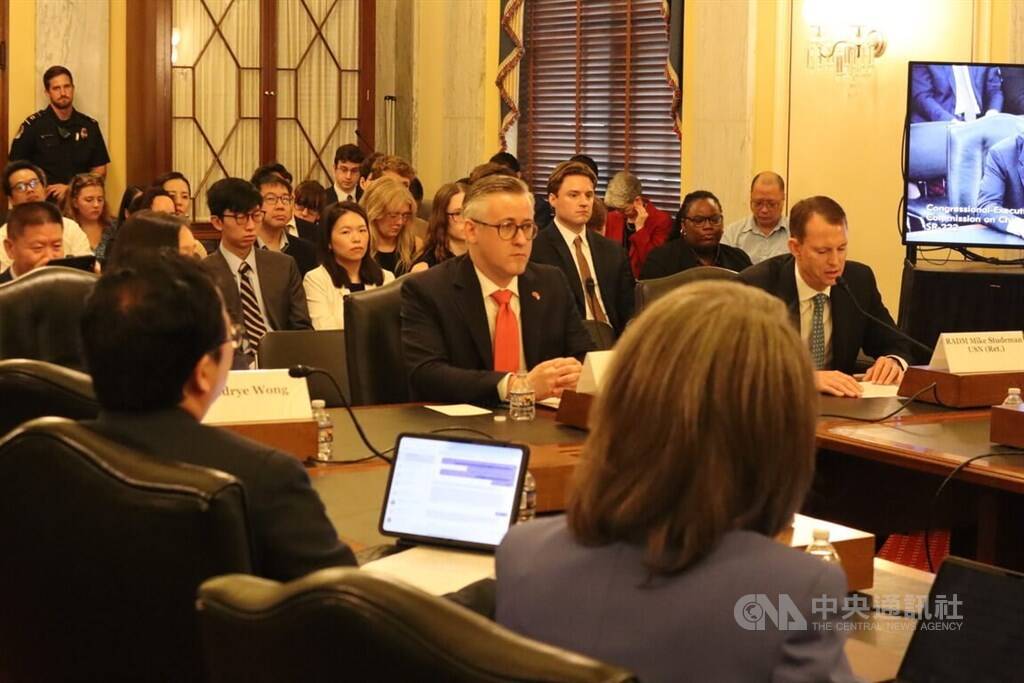Democratic Progressive Party (DPP) Legislator Fan Yun (范雲) on Wednesday testified at a US congressional hearing about Chinese threats and coercion, while a former US naval intelligence chief called on Washington to help Taiwan upgrade its classified clearance system.
The US Congress established the Congressional-Executive Commission on China (CECC) to monitor human rights and the development of rule of law in the People’s Republic of China (PRC), and submit annual reports to the US president and Congress.
Wednesday’s hearing was titled “Stand with Taiwan: Countering the PRC’s Political Warfare and Transnational Repression.”

Photo: Fang Wei-li, Taipei Times
“In addition to growing military threats and economic coercion, the PRC’s political warfare against Taiwan has also escalated,” Fan told the hearing via video link.
China has misinterpreted UN Resolution 2758 for “political propaganda in the international arena” and “seeks to legitimize the use of force to annex Taiwan,” she said.
A planned collision targeting Vice President Hsiao Bi-khim’s (蕭美琴) vehicle in the Czech Republic last year was part of a series of Chinese Communist Party (CCP) activities aimed at intimidating Taiwanese, warning of the cost of resisting China, Fan said.

Photo: CNA
“According to our National Security Bureau, the number of spying activity indictments in 2024 was four times higher than in 2021, rising from 16 to 64,” she said.
Regarding disinformation, the bureau reported that “messages with China’s influence” increased to 2.2 million last year from 1.3 million in 2023, spread via newspapers, TV stations and social media, Fan said, adding that the Global Taiwan Institute found that some media firms received direct instructions from China’s Taiwan Affairs Office.
Moreover, a recent poll found that Taiwanese TikTok users are more likely to view China favorably and believe that if Taipei favors the US government, war is more likely, she said.
“United front” organizations in Taiwan, operated by the CCP, invite religious groups, village wardens and college students on heavily subsidized trips to China, Fan said.
The activities “aim to integrate [college students] into China’s economy” so that they “eventually come to view China’s politics and culture in a positive light,” she said.
The PRC has also recruited criminals in Taiwan to create a nationwide network to import arms, while it funds Taiwanese influencers to produce content in China that aligns with its political agenda, she said.
Following last year’s presidential election, Chinese Nationalist Party (KMT) caucus whip Fu Kun-chi (傅?萁) led 17 legislators, almost one-third of the caucus, on a trip to Beijing to meet with Chinese officials, Fan said.
Shortly thereafter, the KMT, along with the Taiwan People’s Party, “rushed to push through a series of unconstitutional bills, prevented the national security legal amendments from proceeding to a first reading, and froze or slashed the national defense budget without proper justification,” she said.
China’s political warfare against Taiwan aims to “distort the world’s understanding of Taiwan by framing cross-strait conflicts as a domestic issue to isolate Taiwan,” erode the confidence of Taiwanese in the US and reduce their confidence in their own government, leading them to ultimately disengage from politics, Fan said.
Taiwan is countering PRC interference through government-civil society cooperation, raising the national defense budget to a record high and implementing a whole-of-society defense resilience strategy, Fan said, adding that the Ministry of Education is promoting educational material related to those areas.
However, “Taiwan alone will not be enough to deter China’s aggression,” she said.
“Standing with Taiwan, we can work together to protect our shared values, prosperity and the rules-based global order,” Fan said.
In the hearing’s second panel, Mike Studeman, a former US Office of Naval Intelligence commander and retired rear admiral, warned that the CCP’s political warfare efforts are relentless, pervasive and all encompassing.
“Taiwan wouldn’t survive if it only focused on an outside-in strategy of hardening its outer shell with military forces,” Studeman said, adding that equal effort must also be made to bolster core defenses to guard against internal threats.
He proposed a number of ideas that the US could assist Taiwan in dealing with those dangers, such as helping Taiwan to strategically reduce its international isolation.
“Further, encouraging Taiwan to spend more of its GDP on defense, while giving due regard to their political and industrial realities, developing deeper Taiwan and US cooperation on cybersecurity, and helping Taiwan upgrade its classified clearance system and adopt more advanced insider threat technologies,” Studeman said.
By clearance system, he was referring to the framework for managing and reviewing who is authorized to access sensitive intelligence.
Studeman called for coordination between the Ministry of Digital Affairs, the US Cyber Command and the US Cybersecurity and Infrastructure Security Agency to increase resilience of Taiwan’s critical infrastructure.
The CECC hearing was also attended by Jamestown Foundation president Peter Mattis and Audrye Wong, assistant professor of political science and international relations at the University of Southern California.
Additional reporting by Fion Khan and CNA

Taiwan is projected to lose a working-age population of about 6.67 million people in two waves of retirement in the coming years, as the nation confronts accelerating demographic decline and a shortage of younger workers to take their place, the Ministry of the Interior said. Taiwan experienced its largest baby boom between 1958 and 1966, when the population grew by 3.78 million, followed by a second surge of 2.89 million between 1976 and 1982, ministry data showed. In 2023, the first of those baby boom generations — those born in the late 1950s and early 1960s — began to enter retirement, triggering

ECONOMIC BOOST: Should the more than 23 million people eligible for the NT$10,000 handouts spend them the same way as in 2023, GDP could rise 0.5 percent, an official said Universal cash handouts of NT$10,000 (US$330) are to be disbursed late next month at the earliest — including to permanent residents and foreign residents married to Taiwanese — pending legislative approval, the Ministry of Finance said yesterday. The Executive Yuan yesterday approved the Special Act for Strengthening Economic, Social and National Security Resilience in Response to International Circumstances (因應國際情勢強化經濟社會及民生國安韌性特別條例). The NT$550 billion special budget includes NT$236 billion for the cash handouts, plus an additional NT$20 billion set aside as reserve funds, expected to be used to support industries. Handouts might begin one month after the bill is promulgated and would be completed within

One of two tropical depressions that formed off Taiwan yesterday morning could turn into a moderate typhoon by the weekend, the Central Weather Administration (CWA) said yesterday. Tropical Depression No. 21 formed at 8am about 1,850km off the southeast coast, CWA forecaster Lee Meng-hsuan (李孟軒) said. The weather system is expected to move northwest as it builds momentum, possibly intensifying this weekend into a typhoon, which would be called Mitag, Lee said. The radius of the storm is expected to reach almost 200km, she said. It is forecast to approach the southeast of Taiwan on Monday next week and pass through the Bashi Channel

NO CHANGE: The TRA makes clear that the US does not consider the status of Taiwan to have been determined by WWII-era documents, a former AIT deputy director said The American Institute in Taiwan’s (AIT) comments that World War-II era documents do not determine Taiwan’s political status accurately conveyed the US’ stance, the US Department of State said. An AIT spokesperson on Saturday said that a Chinese official mischaracterized World War II-era documents as stating that Taiwan was ceded to the China. The remarks from the US’ de facto embassy in Taiwan drew criticism from the Ma Ying-jeou Foundation, whose director said the comments put Taiwan in danger. The Chinese-language United Daily News yesterday reported that a US State Department spokesperson confirmed the AIT’s position. They added that the US would continue to